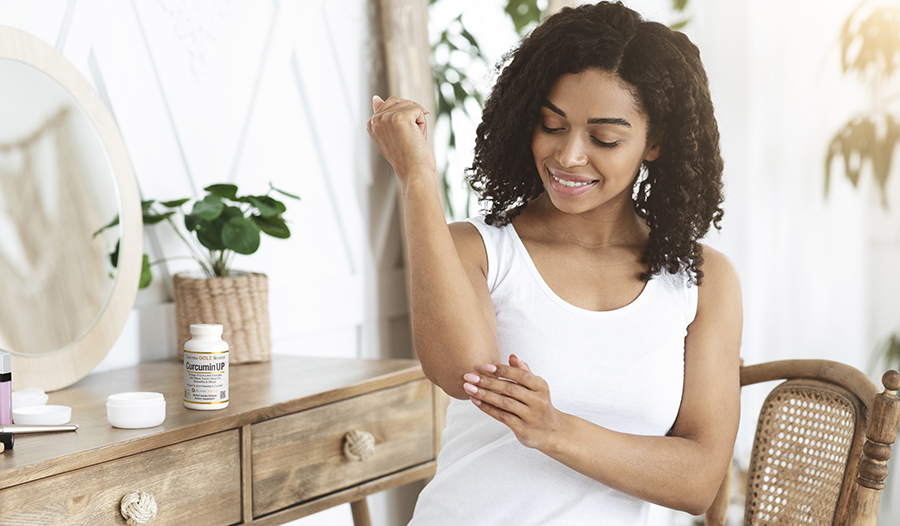4 Natural Approaches to Psoriasis According to a Naturopathic Doctor

August is Psoriasis Awareness Month. This month helps bring much-needed attention to psoriasis, an autoimmune disorder that affects over 125 million individuals worldwide.
Psoriasis is a chronic inflammatory disease of the skin with a potent component of autoimmunity. In addition to high levels of inflammation associated with psoriasis, the body’s immune system mistakes its tissues as foreign and attacks them.
Symptoms of Psoriasis
Symptoms of psoriasis include:
- Raised red, inflamed patches of skin covered in silver or white colored scales
- Itchiness
- Dry skin that may bleed
- Pits or tiny dents in the nails
- Sometimes pain in the joints
Psoriasis can be mild, moderate, or severe, depending on the amount of the body covered in psoriatic plaques and the amount of distress it causes.
Types of Psoriasis
Different types of psoriasis either affect various parts of the body or cause different reactions in the body. For example, inverse psoriasis is a condition that can occur with increased weight gain after a diagnosis of plaque psoriasis. Symptoms include smooth red, painful rashes only where skin touches skin, like the armpits or the groin area.
Then there is erythrodermic psoriasis, a painful and alarming form of psoriasis which can occur if plaque psoriasis isn’t well managed. Symptoms of this type of psoriasis include redness over most of the body’s skin, fever, and even dehydration. This form of psoriasis requires immediate emergency medical attention.
Other types of psoriasis range from pustular psoriasis, characterized by pus-filled bumps (pustules) and red, itchy, painful skin, to plague psoriasis, which gets characterized by raised red, inflamed, itchy patches covered by scales.
Plaque psoriasis is the most common form of psoriasis, accounting for approximately 90% of psoriasis cases. Unfortunately, this skin disorder has a strong genetic predisposition, and environmental risk factors often contribute to its severity. For example, psoriasis has gotten linked to gut dysbiosis. Gut dysbiosis is an imbalance between the helpful and harmful bacteria that live in the human gut.
Psoriasis has also gotten linked to other illnesses like cardiovascular disorders, psoriatic arthritis, and even depression. Psoriasis is a severe illness that affects millions of people.
Natural Approaches to Psoriasis
Unfortunately, there isn’t a cure for psoriasis, but that doesn’t mean that medicine isn’t working hard to find one. Other research suggests that psoriasis may benefit from a more integrative and holistic approach, with up to 51% of people with psoriasis using complementary and alternative medicine for their condition.
Curcumin
For example, research suggests that curcumin, the primary polyphenol in the golden-colored spice turmeric, may prove beneficial for psoriasis. Curcumin is a powerful antioxidant or free radical scavenger as well as a potent anti-inflammatory.
Studies show that curcumin reduces the free radical damage characteristic of psoriasis plaques, reduces inflammation, enhances the protective skin barrier, which is usually compromised with psoriasis and decreases the rapid growth of skin cells which is one of the biggest contributors to psoriasis.
Furthermore, research suggests that oral intake of curcumin and topical steroid use for psoriasis had better outcomes than steroid use alone. Curcumin has some amazing properties that may be helpful for psoriasis.
Vitamin D
Research on vitamin D is also promising. For instance, studies suggest that low vitamin D status is associated with increased psoriasis severity. Vitamin D isn’t just a plain old vitamin. It acts more like a steroid hormone and plays many critical roles in the body. For example, vitamin D has a role in bone health, reproductive health, and immune system health.
Vitamin D helps strengthen the immune system by helping produce cathelicidins and defensins, proteins that help fight off foreign invaders in the body. It also plays a massive role in regulating the immune system, bringing it back into balance when it is overactive.
Since psoriasis is an autoimmune disease, the benefit of vitamin D regulating the immune system and bringing it back into balance to those suffering from the disorder is profound.
Fish Oil
Another natural approach that has been studied for psoriasis is fish oil. Fish oil —found as docosahexaenoic acid (DHA) and eicosapentaenoic acid (EPA)—often comprises cold-water fish like mackerel, salmon, and tuna. Fish oil has many different benefits for the body, including helping cardiovascular health, joint health, and reducing inflammation.
Fish oil is a potent anti-inflammatory that may be helpful for those with psoriasis. For example, research suggests that fish oil helps decrease the amount of redness, thickness, and scaliness of the skin while also improving scores on the Psoriasis Area and Severity Index (PASI). PASI is a tool used to score and understand the severity and breadth of psoriasis in those affected by the disease.
Studies also suggest that diets high in fish oil can be beneficial for improving the severity of psoriasis. While research suggests that fish oil may be beneficial for psoriasis, studies also show that fish oil seems to be the most effective when combined with more conventional therapies and lifestyle changes.
Weight Management
Weight loss can be beneficial for those living with psoriasis. Research shows that losing weight can effectively reduce the severity of psoriasis and decrease the aggravation of psoriasis lesions. Body mass index, or BMI, is a value used to measure body fat by using both height and weight. While BMI can have downfalls for certain populations like heavy weight lifters or athletes, a higher BMI (over 35) was associated with a greater risk for psoriasis.
Obesity, defined as a BMI of 30 or greater, is associated with higher levels of inflammation throughout the body. This inflammation is a characteristic that is also shared with psoriasis. The research proposes that losing weight also improves the effectiveness of conventional therapies for psoriasis and reducing inflammation.
Takeaway
As we celebrate Psoriasis Awareness Month this August, it is helpful to remember the enormity of this devastating illness. As research reveals more about the effects of this chronic disease and approaches that may improve it, there is hope that those with psoriasis will be able to enjoy life without letting their illness stop them.
References:
- Griffiths CE, Barker JN. Pathogenesis and clinical features of psoriasis. Lancet. 2007;370(9583):263-271. doi:10.1016/S0140-6736(07)61128-3
- Myers B, Brownstone N, Reddy V, et al. The gut microbiome in psoriasis and psoriatic arthritis. Best Pract Res Clin Rheumatol. 2019;33(6):101494. doi:10.1016/j.berh.2020.101494
- Armstrong AW, Read C. Pathophysiology, Clinical Presentation, and Treatment of Psoriasis: A Review. JAMA. 2020;323(19):1945-1960. doi:10.1001/jama.2020.4006
- Gamret AC, Price A, Fertig RM, Lev-Tov H, Nichols AJ. Complementary and Alternative Medicine Therapies for Psoriasis: A Systematic Review. JAMA Dermatol. 2018;154(11):1330-1337. doi:10.1001/jamadermatol.2018.2972
- Nardo VD, Gianfaldoni S, Tchernev G, et al. Use of Curcumin in Psoriasis. Open Access Maced J Med Sci. 2018;6(1):218-220. Published 2018 Jan 21. doi:10.3889/oamjms.2018.055
- Antiga E, Bonciolini V, Volpi W, Del Bianco E, Caproni M. Oral Curcumin (Meriva) Is Effective as an Adjuvant Treatment and Is Able to Reduce IL-22 Serum Levels in Patients with Psoriasis Vulgaris. Biomed Res Int. 2015;2015:283634. doi:10.1155/2015/283634
- Barrea L, Savanelli MC, Di Somma C, et al. Vitamin D and its role in psoriasis: An overview of the dermatologist and nutritionist. Rev Endocr Metab Disord. 2017;18(2):195-205. doi:10.1007/s11154-017-9411-6
- Algazinа T, Touir G, Pshembayevа S, Jetpisbayeva Z, Batpenova G. Georgian Med News. 2019;(290):96-100.
- Bishop E, Ismailova A, Dimeloe SK, Hewison M, White JH. Vitamin D and immune regulation: antibacterial, antiviral, anti-inflammatory [published online ahead of print, 2020 Aug 22]. JBMR Plus. 2020;5(1):e10405. doi:10.1002/jbm4.10405
- Millsop JW, Bhatia BK, Debbaneh M, Koo J, Liao W. Diet and psoriasis, part III: role of nutritional supplements. J Am Acad Dermatol. 2014;71(3):561-569. doi:10.1016/j.jaad.2014.03.016
- Wolters M. Diet and psoriasis: experimental data and clinical evidence. Br J Dermatol. 2005;153(4):706-714. doi:10.1111/j.1365-2133.2005.06781.x
- Chen X, Hong S, Sun X, et al. Efficacy of fish oil and its components in the management of psoriasis: a systematic review of 18 randomized controlled trials. Nutr Rev. 2020;78(10):827-840. doi:10.1093/nutrit/nuz098
- Kunz M, Simon JC, Saalbach A. Psoriasis: Obesity and Fatty Acids. Front Immunol. 2019;10:1807. Published 2019 Jul 31. doi:10.3389/fimmu.2019.01807
- Debbaneh M, Millsop JW, Bhatia BK, Koo J, Liao W. Diet and psoriasis, part I: Impact of weight loss interventions. J Am Acad Dermatol. 2014;71(1):133-140. doi:10.1016/j.jaad.2014.02.012
- Liu R, Nikolajczyk BS. Tissue Immune Cells Fuel Obesity-Associated Inflammation in Adipose Tissue and Beyond. Front Immunol. 2019;10:1587. Published 2019 Jul 17. doi:10.3389/
- Jensen P, Skov L. Psoriasis and Obesity. Dermatology. 2016;232(6):633-639. doi:10.1159/000455840
DISCLAIMER:This Wellness Hub does not intend to provide diagnosis...
















































































 Table of Contents
Table of Contents















